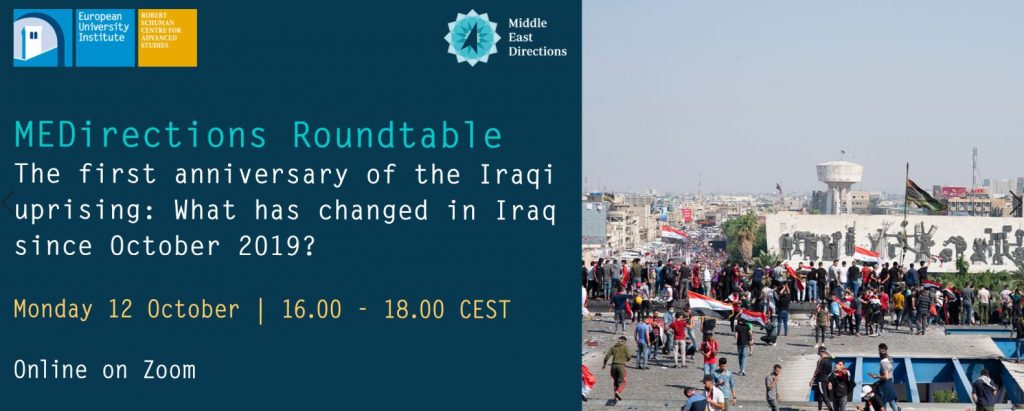
While Iraqi protesters are celebrating the first anniversary of their popular uprising this month, the Iraqi political scene looks much different from what it was when this protest movement started in October 2019. The uprising has pushed former Prime Minister Adel Abdul Mahdi to resign, and the new Prime Minister Mustafa Al-Kadhimi has promised to achieve the protesters demands, including ensuring state control over the militias. This last period has seen also a new episode in the escalation between Iran and the US with the assassination of Qasem Soleimani, commander of Quds Force, in January 2020 in Baghdad. Finally, the ongoing COVID-19 crisis has further exposed the weaknesses of Iraqi state institutions while raising many questions on its ability to handle these types of emergencies without the help of non-state actors, including militias.
This roundtable seeks to offer an assessment of the first year since the October 2019 uprising: what has been achieved so far and what are the challenges lying ahead? How would the new political leadership, the tensions between the US and Iran, as well as the COVID-19 pandemic, influence, positively or negatively, the popular uprising in its second year, as well as the overall political scene in Iraq?
Moderator
Georges Fahmi is a research fellow at the Middle East Directions Programme of the Robert Schuman Centre for Advanced Studies, European University Institute in Fiesole, Italy. Previously, Fahmi was a non-resident scholar at the Carnegie Middle East Centre in Beirut, Lebanon. His research focuses on religious actors in democratic transition in the Middle East, the interplay between state and religion in Egypt and Tunisia, and religious minorities and citizenship in Egypt and Syria.
Speakers
Inna Rudolf is a Research Fellow at The International Centre for the Study of Radicalisation (ICSR), pursuing her PhD at King’s College London’s Department of War Studies. Her research interests include popular mobilization tactics as well as the hybridisation of security sector governance. In her current research she focuses on the evolving relationship between the Iraqi state and the Popular Mobilization Units (PMU) as a state-sanctioned paramilitary umbrella. Prior to joining ICSR, she has been representing the BMW Foundation Herbert Quandt in the Middle East and North Africa region.
Tamer Badawi is an Associate with the Middle East Directions Programme, focusing on Iran’s foreign policy toward its neighbors and paramilitaries in Iraq and the neighborhood. He is also affiliated with the Al Sharq Forum and was previously affiliated with the School of Transnational Governance in the European University Institute as a Policy Leader Fellow. He received an MA in International Relations and European Studies from the Central European University.
Everyone is welcome.
*The Zoom link and access details will be provided only to registered participants. Zoom links are emailed on the day of the event.
In case you missed it, WATCH THE VIDEO HERE:



